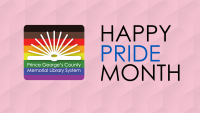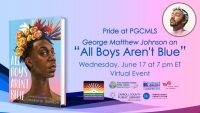Pride at PGCMLS
Prince George's County Memorial Library System, Md.
Innovation Synopsis
In 2019, PGCMLS formed a systemwide staff team to address a longstanding deficit in programming and outreach activities supporting the LGBTQ+ community. Reflecting the library's new strategic framework, the team led a major expansion of LGBTQ+ online content, programs and special projects in just a few months — despite the impact of COVID-19.
Challenge/Opportunity
Prince George's County has prioritized improving services to the local LGBTQ+ community. The library has a strong practice of acquiring and serving LGBTQ+ books and movies, however, that strength was not reflected in systemwide support of programming. LGBTQ+ programs were previously limited to those that individual branch staff members took the initiative to present. The community has ongoing incidents of discrimination and violence directed at LGBTQ+ Prince Georgians and the library committed to proactive inclusion.
Key Elements of Innovation
Prior to COVID-19, the staff team had planned the library's inaugural Rainbow Family Festival and first appearance in the Capital Pride Parade. This had to shift to all virtual programming and engagement. The library's first LGBTQ+ Pride Heritage web page was developed, with an intentional focus on cross-generational education. Intersectional events addressed Pride & Black Lives Matter: R. Eric Thomas & George Johnson. A crowdsourced virtual pride quilt and testimonial videos demonstrate PGCMLS as a welcoming environment.
Achieved Outcomes
The primary goal of this initiative was to make a splash and reset the library as a visibly welcoming home for LGBTQ+ Prince Georgians. While there were significant quantitative accomplishments, such as producing 14 systemwide events, the qualitative outcomes were most significant. The library's Pride programs were featured by our local elected officials, partner agencies and libraries throughout the state, and parents shared testimonials of how the programs taught them ways to better support their LGBTQ+ children.



